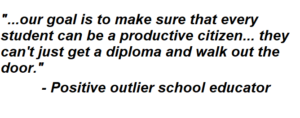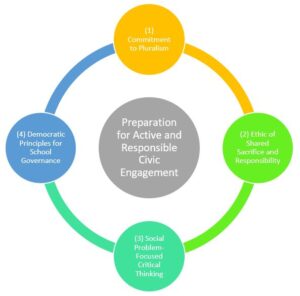New Research Findings on Promoting Civil Discourse and Civic Engagement from NYKids Positive Outlier Schools
By Kristen C. Wilcox, Catherine Kramer, and Amanda Lester
“A democracy is more than a form of government; it is primarily a mode of associated living, of conjoint communicated experience. Democracy has to be born a new every generation, and education is its midwife.” – John Dewey
The events of January 6th, 2021 are cause for reflection on the importance of valuing civil discourse and nurturing active and responsible civic engagement. Threats to undermine and destabilize democracy in the United States and around the world have gained considerable attention from political scientists and other scholars for years, and alarming trends in the civic habits of Americans, coupled with new sociopolitical terrain – largely precipitated by advances in information technology and globalization – present challenges to the functioning of social and political life. Hytten (2017) among others has argued that, in part, democracy is under threat because it has been viewed primarily as a political process rather than an “ethical ideal that must be deliberately fostered and nourished in order for it to survive”.
In the United States, public schools have historically functioned to play a role in preparing young people to engage actively and responsibly in civil society. However, in the presence of educational inequities, and with a paucity of intentional and prioritized goals for civic preparation as well as inadequate access to impactful learning opportunities, centering instruction in ways that focus on civil discourse and active and responsible civic engagement has become elusive for too many educators. Clearly, preparing well-rounded and critically-thinking young people ready to meet the demands of citizenship in the 21st century is an imperative, albeit increasingly complex, task.
NYKids’ Study and Civic Engagement: An Unexpected Finding
Dewey’s (1916) contributions to theories of learning focused on promoting norms of free discourse, dissent, and accountability, and these are more critical than ever. Framed by such theories, findings from NYKids’ multiple case study of schools in New York State provides evidence that educators in positive outlier schools utilize practices that incorporate Positive Youth Development (PYD) and Deeper Learning (DL) strategies to facilitate students’ development of skills, abilities, and dispositions that define 21st century citizenship.
Given the retreat of citizenship education in the last half of the 20th century in favor of a skill-based orientation and the upsurge of social and political turmoil in United States, our NYKids multiple case study focused on how positive outlier schools compared to typically performing schools in their approaches toward encouraging civil discourse and civic engagement.
 The positive outlier schools in this study included Alfred Almond Junior Senior High School, Crown Point Central School, Freeport High School, Malverne Senior High School, Maple Grove Junior-Senior High School, and Port Chester Senior High School . These schools were initially selected for their relative success in preparing young people for college and career as measured by their graduation rates and in light of the demographics (i.e. ethnic, cultural, and socioeconomic diversity) of their communities. Yet, as we analyzed the data with regard to college and career readiness, we noted the presence of a civic-focused curriculum and related practices that suggested a reemerging focus on citizenship.
The positive outlier schools in this study included Alfred Almond Junior Senior High School, Crown Point Central School, Freeport High School, Malverne Senior High School, Maple Grove Junior-Senior High School, and Port Chester Senior High School . These schools were initially selected for their relative success in preparing young people for college and career as measured by their graduation rates and in light of the demographics (i.e. ethnic, cultural, and socioeconomic diversity) of their communities. Yet, as we analyzed the data with regard to college and career readiness, we noted the presence of a civic-focused curriculum and related practices that suggested a reemerging focus on citizenship.
In contrast to educators at typically performing schools, educators in positive outlier schools not only see themselves as responsible for preparing students to succeed in college or career after high school, but also for preparing students to be responsible citizens and contributing community members. A student support staff member at one of the positive outlier schools said, “…our goal is to make sure that every student can be a productive citizen … they can’t just get a diploma and walk out the door.”
Four Strategies for Encouraging Civil Discourse and Civic Engagement
From our analysis we identified four strategies for encouraging civil discourse and civic engagement that distinguished the positive outlier schools from their typically performing counterparts:
(1) Commitment to Pluralism: Educators communicated a commitment to pluralism by celebrating diverse perspectives, abilities, and identities across the school community.
 (2) Ethic of Shared Sacrifice and Responsibility: Educators set expectations and standards for student conduct and behavior, which were intended to foster a reciprocal relationship of trust and mutual respect between individuals and the community. This focus was based on the belief that individual benefits such as “belongingness” accrue when there are expectations set forth for students to be responsible for something greater than self, such that a sense of ownership for the impact of individual actions on the collective good connects students to the community.
(2) Ethic of Shared Sacrifice and Responsibility: Educators set expectations and standards for student conduct and behavior, which were intended to foster a reciprocal relationship of trust and mutual respect between individuals and the community. This focus was based on the belief that individual benefits such as “belongingness” accrue when there are expectations set forth for students to be responsible for something greater than self, such that a sense of ownership for the impact of individual actions on the collective good connects students to the community.
(3) Social Problem-Focused Critical Thinking: Educators identified critical thinking as key to encouraging students to become responsible citizens who can navigate complex social problems. In particular, educators noted the ways in which modern society places new demands and responsibilities on classroom teachers to include opportunities for robust discourse around social problems where students explore a range of views rather than ascribing to insular viewpoints or take on reactive stances.
(4) Democratic Principles for School Governance: Unlike at typically performing schools, where hierarchical approaches to governance were dominant, educators at positive outlier schools embraced democratic principles for school governance. A distinguishing feature of positive outlier schools in this regard was the acknowledgement that a communal approach to leadership where students, parents, and families were brought into formal governance processes could deliver important benefits to the school community.
In light of these findings, we recommend the following resources to support civil discourse and active and responsible civic engagement:
- https://www.icivics.org/– from University at Albany’s AATLAS for free resources for classroom teachers
- https://www.pbs.org/newshour/extra/lessons-plans/lesson-plan-civic-engagement-and-ways-for-students-to-get-involved/ – from PBS on lesson plans for middle school/high school teachers
- https://www.edweek.org/teaching-learning/15-classroom-resources-for-discussing-racism-policing-and-protest/2020/06– from Education Week on discussing racism, policing, and protests
- https://www.facinghistory.org/educator-resources/current-events/responding-insurrection-us-capitol – from Facing History and Ourselves for educator resources on responding to the Insurrection at the US Capitol
Find more about the College and Career Readiness Phase 1 study report and related case studies on our research page. These can be used for professional development guided by our experts (contact us at nykids@albany.edu ) or your own. Also see our new set of resources titled: Promoting Civil Discourse and Civic Engagement on our website.
